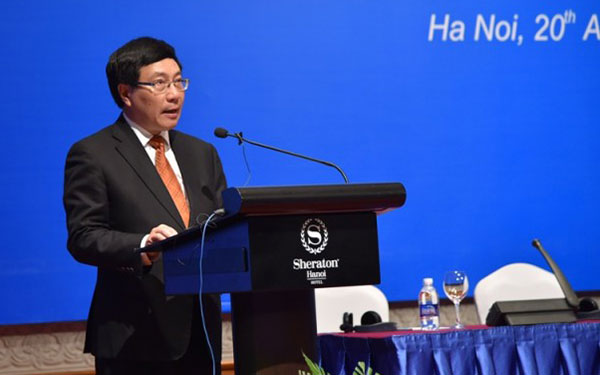ASEM conference in Hanoi calls for greater global cooperation
 |
Deputy Prime Minister and Minister of Foreign Affairs Pham Binh Minh said at last week’s conference on “Enhancing the comprehensive Asia-Europe Partnership in the 21st century” in Hanoi that, “At this point in time, the world continues to witness profound changes that give rise to new issues and challenges to multilateral forums and mechanisms, including the Asia-Europe Meeting (ASEM).”
“The world economy is undergoing a fundamental transformation. With the Fourth Industrial Revolution coming to the fore, new mind-sets, policies, and practices are taking shape in ways that foster green, sustainable, and innovative development and closely link development to economic growth,” he added.
Minh went on to say that amidst observable trends in the democratisation of international relations and the strong growth of partnerships and next-generation free trade agreements, global challenges are growing more complex. Major threats include increasing poverty and the development gap, climate change, natural disasters, salinization, population ageing, urbanisation, and the water-energy-food nexus. These issues cannot be dealt with by any individual country or region alone.
 |
"Addressing them is both an imperative need and an impetus for stronger co-operation to ensure sustainable development in each member country on the two continents. This undoubtedly requires ASEM members to enhance connectivity," he noted.
At the event, which attracted 150 domestic and international delegates, ASEM members also reviewed the body’s 20 years of development, assessed major changes in Asia and Europe, and identified opportunities and obstacles for the future. The attendees talked of ASEM’s direction in the next decade, new approaches to people-to-people interactions, and explored how best to strengthen ASEM’s main pillars of co-operation, which include politics and economics alike.
According to Minh, Vietnam’s engagement as a founding member of ASEM in 1996 marked a major step in implementing the country’s policies of expansion, diversification of relations, and international economic integration. ASEM is of great importance to Vietnam’s reform, development, and far-reaching international integration.
Vietnam’s most notable contribution was hosting the fifth ASEM Summit in 2004 and the ministers’ meetings in the fields of economics, information technology, external affairs, education, and labour from 2001-2012. Minh said that Vietnam has led the way, carrying out a number of ASEM initiatives, adding that the country proposed 21 initiatives and co-sponsored 24 others in various fields, such as food security, natural disaster prevention, and climate change adaptation.
Currently, ASEM is home to 19 of Vietnam’s 25 strategic and comprehensive partners, making up 70 per cent of its FDI and international trade, and 80 per cent of international tourists visiting Vietnam. Additionally, 14 of the 16 free trade agreements (FTAs) signed or under negotiation by Vietnam are with ASEM partners. This enables Vietnam to become a crucial link in the large economic integration network of 60 partners, 47 of whom are ASEM members.
| The Asia–Europe Meeting (ASEM) was officially established in March 1996 at the first summit in Bangkok, Thailand, as an informal platform for dialogue and co-operation between member states, the European Union (EU), and the ASEAN Secretariat. After five rounds of enlargement, the total ASEM membership has doubled to 53 partners. ASEM represents around 60 per cent of the world’s population, 52 per cent of the global GDP, and almost 68 per cent of world trade. Throughout its evolution, ASEM has maintained a consistent edge as a forum for political dialogue between member countries, with diverse and complementing capacities. Inter-dependence, equal partnership, mutual respect and benefit, an open and evolutionary process, and equal impetus to the key dimensions of political dialogue, economic co-operation, and socio-cultural co-operation are all key principles in ASEM. |
What the stars mean:
★ Poor ★ ★ Promising ★★★ Good ★★★★ Very good ★★★★★ Exceptional
Latest News
More News
- Foreign fruits flood Vietnamese market (December 09, 2025 | 13:22)
- Vietnam’s fruit and vegetable exports reach $7.8 billion in first 11 months (December 05, 2025 | 13:50)
- Vietnam shapes next-generation carbon market (November 26, 2025 | 15:33)
- PM urges Ho Chi Minh City to innovate and remain Vietnam’s economic locomotive (November 26, 2025 | 15:29)
- Experts chart Vietnam's digital finance path: high hopes, high stakes (November 14, 2025 | 10:56)
- Vietnam’s seafood imports surge 30 per cent in first 10 months (November 10, 2025 | 19:35)
- Vietnam’s durian exports hit $1 billion milestone (October 30, 2025 | 17:41)
- Beyond borders: Sunhouse and new era of Vietnamese brands on Amazon (October 28, 2025 | 10:46)
- Record-breaking trade fair set to open in Hanoi (October 15, 2025 | 15:59)
- Timber sector seeks solutions to VAT refunds (October 14, 2025 | 18:58)
















 Mobile Version
Mobile Version